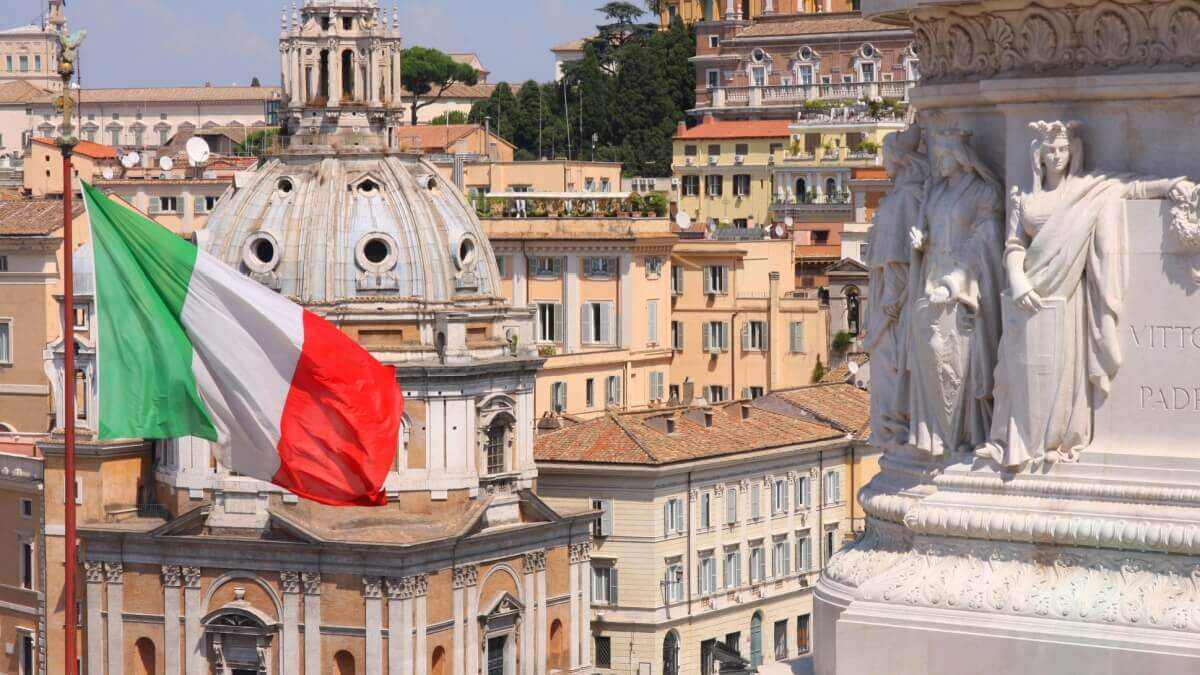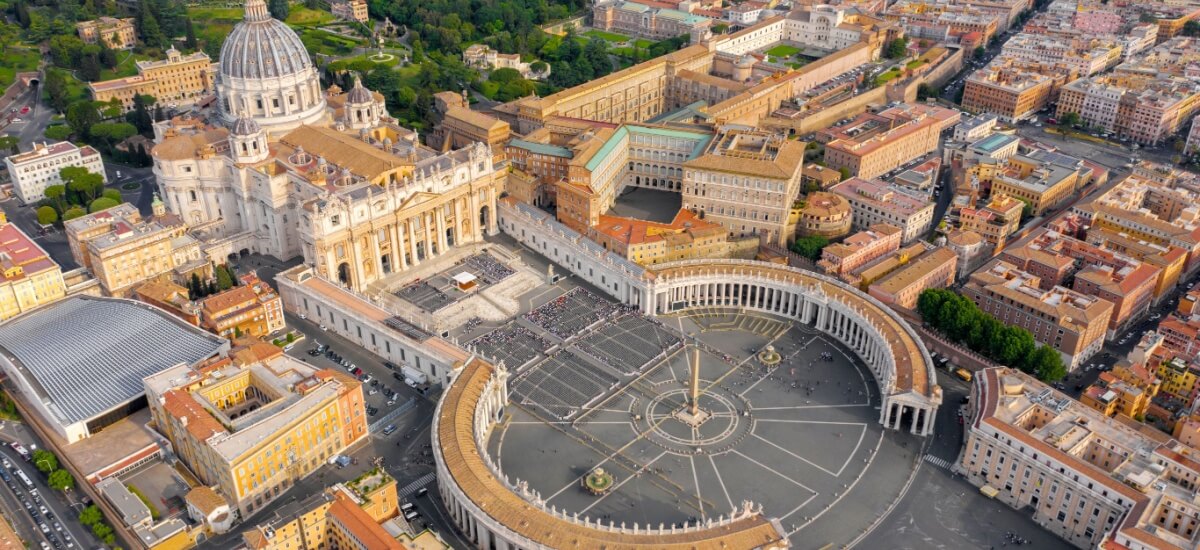Family reunification visa in Italy: Requirements for Americans
Applying for the Family Reunification Visa Italy? Learn all about the application process, costs, and processing times to reunite with loved ones.

Italy has charmed expats with its legendary food, architecture and history for decades. While some areas can be pricey, renting in Italy is often more affordable than you might think.
In fact, the average cost of a 1-bedroom apartment in a major city center is just around 746 EUR (or 830 USD) per month.¹ If you’re planning to live outside of a major city, you’re likely to find the cost of living to be much more reasonable than it is in the US or many other European countries.
| 🚀 Whether you're moving to Italy for work or to infuse more pasta into your life, use Wise to pay your rent and spend like a local. |
|---|
Yes, Americans can rent property in Italy. That said, the process may look different depending on your visa status and how long you're staying in the country.
EU citizens typically have an easier time renting. Non-EU citizens (including Americans) need to prove their legal residency.
Most commonly, this means having a work visa, but student visas and other paperwork that allows you to legally live in Italy long-term are fine, too.
Getting an apartment without a job in Italy depends on your situation.
EU residents don't need a job to rent, but landlords usually require proof of income. Non-EU residents must prove legal residency, which often means having a work visa. However, students or those with other valid visas can also rent.
If you don't have a job, be prepared to show substantial savings or a guarantor to secure a rental.
So, how much is an apartment in Italy? The short answer is that it depends on the city and neighborhood.
Here's a comparison of average monthly rents for a 1-bedroom apartment in the city center of 5 major Italian cities.
| City | Monthly rent (1-bedroom, city center) |
|---|---|
| Rome | 1,101 EUR (~1,224 USD)² |
| Bologna | 994 EUR (~1,105 USD)³ |
| Florence | 979 EUR (~1,088 USD)⁴ |
| Milan | 1,382 EUR (~1,537 USD)⁵ |
| Naples | 766 EUR (~851 USD)⁶ |
Milan stands out as one of the most expensive cities for renters. Naples, on the other hand, has pretty affordable options. Rome, Bologna, and Florence fall in the middle range.
You can typically find lower prices outside of city centers and in smaller towns. Rent in popular tourist areas will usually always be much higher than the average.
Renting an apartment in Italy comes with additional costs. Your typical monthly expenses will most likely include the following:
| Category | Average monthly cost¹ |
|---|---|
| Utilities | 199 EUR (~221 USD) |
| Internet and cable | 27 EUR (~30 USD) |
Utilities usually include the garbage service, gas, electricity, and water. There's also a 90 EUR/year "TV tax" (Canone RAI) in Italy, but it's typically automatically incorporated into your electric bill.
Some landlords might include certain utilities in the rent, so always clarify what's included in your rental costs.
Yes, negotiating rent in Italy is common and often expected. Most rentals come from private owners, so there’s usually a little wiggle room in their price. They're more likely to be flexible than a major rental company.
Having a local real estate agent or an Italian-speaking friend negotiate on your behalf can be a good idea. Landlords sometimes assume expats - especially Americans - have larger budgets and hike prices for foreigners.
Overall, don't be afraid to politely discuss the rent, especially for longer-term leases.
If you're wondering how to rent an apartment in Italy, be prepared for some hefty paperwork. Landlords are cautious and want to protect their property.
You'll typically need:
- Valid passport or ID
- Proof of income (job contract, bank statements)
- Italian tax code (codice fiscale)
- Residency permit/visa (for non-EU citizens)
- References (sometimes required)
Having these documents ready can speed up the rental process. If you're working with a real estate agent, they can help you gather all of the necessary paperwork.
Keep in mind that documents in English will most likely need to be translated into Italian.

Wise offers you a quick, secure and transparent way of sending money to Italy. You get the mid-market exchange rate for your payments and see how much it’s charged for the transfer before sending the money from your bank.
With the Wise Account you can also hold 40+ currencies, spend money in 150+ countries, and receive like a local in 9 different currencies.
Please see Terms of Use for your region or visit Wise Fees & Pricing for the most up to date pricing and fee information
Many people rent an apartment in Italy. But there are also other types of property to suit different needs and budgets.
Usually, you'll be able to rent:
- Apartments (appartamenti): The most common type of rental, especially in cities
- Houses (case): They offer more space but are less popular in cities
- Villas: Luxury options, usually found in upscale areas or the countryside
- Rooms (stanze): Renting a room in a shared apartment is popular with students or young professionals
- Historic properties: You might find an apartment in a restored historic building - these come with unique charm (and sometimes quirks)
Make sure to look at different properties to see what works best for your lifestyle, budget and preferences.
Whether or not you’ll be able to rent furnished depends on your lease term.
Long-term rentals (2-4 year leases) typically come unfurnished. In Italy, "unfurnished" often means completely empty - no appliances, light fixtures or even kitchen cabinets.
Short-term rentals (six months to one year) are more likely to be furnished. These come with furniture, appliances and basic household items.
When looking at listings, pay attention to whether they're labeled as "arredato" (furnished) or "non arredato" (unfurnished). You can also always ask the landlord or your agent about what's included.
Finding an apartment or house to rent in Italy from abroad can seem difficult, but there are a few steps that you can take:
- Online listings: Websites like Immobiliare, Idealista, and Subito are great for apartment hunting
- Real estate agencies: Hiring a realtor can make the process much easier
- Word of mouth: You can ask fellow expats about rental opportunities
- Social media: Facebook groups for expats sometimes post rental listings
- University resources: If you're a student, your university might provide housing or housing resources
You can also book a short-term stay using a website like Airbnb and search for a long-term rental when you're already in Italy. This will allow you to get a "feel" for different neighborhoods before committing to a longer lease.
Some good sites to start your apartment search include:
Alternatively, if you’re looking for a roommate you can check out:
You can narrow down Italian rental properties based on location, price range and property features. Once you see a property you like, get in touch with the owner and ask to schedule a viewing.
Most rental transactions in Italy are safe and legitimate. But as an expat, it's important to be cautious so you don’t end up losing your money.
- Never pay in cash, especially before signing a contract. Use traceable payment methods like a wire
- Don't send money to landlords you haven't met in person
- Be wary of landlords who want to mail you keys
- Try to verify the landlord's ownership of the property
- If subletting, make sure the person has the right to sublet
- Be cautious of deals that seem too good to be true
- Always view the property in person before committing
- Use a reputable real estate agency
Trust your instincts. If something feels off about a rental, it's better to walk away and find a more trustworthy option.
Renting in Italy is pretty similar to renting in other countries. But there are a few things to keep in mind:
Location: Look for properties close to your work and amenities like grocery stores and restaurants
Budget: Factor in rent, utilities and real estate agent fees (if using one)
Lease terms: Understand the length of the contract and what falls within your and your landlord's responsibilities
Condition of the property: Check for any needed repairs or renovations and clarify with your landlord who's responsible for them
Parking: If you have a car, ask about available parking
Natural light: Italian buildings can sometimes be dark, so check if there's enough light
Heating and cooling: Not all properties have air conditioning, which you might want in the summer
Noise levels: You might have noise from the street, especially if the property is close to restaurants and bars
Storage space: Italian apartments are often small and have limited storage
Building rules: Some apartments have restrictions on pets, parties and other important regulations
Take your time to find a place that truly meets your standards and needs. Don't rush into a tenancy agreement right away!

The process of renting an apartment in Italy (or any other property, for that matter) typically looks like this:
- Find a property you like
- Schedule a viewing with the landlord or agent
- If interested, apply to rent it
- Provide necessary documents (ID, proof of income, etc.)
- Negotiate terms (if you want to)
- Review and sign the rental contract
- Pay the security deposit and first month's rent
- Arrange for utilities to be connected in your name (if necessary)
- Schedule a move-in date and get the keys
In major cities like Rome, this process can move quickly. So, be prepared with your documents and deposit money to secure a property you like.
In Italy, most apartments are rented directly by their owners. That said, many owners work with agents or brokers to handle negotiations and paperwork.
You can hire a real estate agent, too. Working with an agent comes with certain advantages, such as:
- Access to more properties
- Help with negotiations
- Assistance with paperwork and contracts
- Local market knowledge
- Language support if you don't speak Italian
Agents typically charge a fee, often equivalent to one month's rent. Sometimes your landlord will split this fee with you. Hiring an agent is an extra cost, but it might be worth it for convenience.
Rental contracts in Italy are legally binding documents. Your rental contract should include details such as the rent amount, payment schedule, lease duration and any specific rules or restrictions (such as whether you're allowed to sublet the property).
In Italy, tenants have rights protected by law:
- Right to a written contract
- Protection from unfair eviction
- Right to a safe and habitable living space
- Privacy (landlords must give notice before entering)
- Right to make minor repairs and deduct from rent (with landlord's agreement)
- Right to sublease (if permitted in the contract)
At the same time, you're expected to:
- Pay rent on time
- Maintain the property in good condition
- Not disturb neighbors
- Get the landlord’s approval for any significant changes to the property
- Any other conditions specified by your rental agreement
Landlords can terminate your rental contract if you violate your responsibilities.
Because apartments are mostly rented by their owners, rules around subletting will vary from apartment to apartment.
There are different types of rental contracts in Italy.
- Free market agreement (4+4 contract): A 4-year contract, renewable for another four years. Rent is set by the landlord. This is the most common type of rental contract
- Contract with an agreed rate (3+2 contract): A 3-year contract, renewable for two more years. Rent is based on rates agreed upon by local authorities and tenant/landlord organizations
- Short-term contract for students or temporary workers: Lasts 6-36 months, often furnished
- Tourism contract: For short-term holiday rentals
The exact contents of your contract will vary from apartment to apartment, but should typically include the following information:
- Full names and addresses of landlord and tenant
- Property details
- Rent amount and payment terms
- Deposit amount and return conditions
- Lease duration and renewal terms
- Termination clauses (for you and your landlord)
- Any specific rules or restrictions
Deposits are typically 2-3 months' rent.⁷ Your contract should clearly state the deposit amount and conditions for its return.
Always review the contract carefully before signing.
Whether you're thinking about renting a house in Italy or an apartment, here are a few common Italian rental terms:
- Appartamento in affitto: Apartment for rent
- Contratto di affitto: Rental contract
- Arredato: Furnished
- Bilocale: One-bedroom apartment
- Due camere da letto: Two-bedroom apartment
- Monolocale: Studio apartment
- Servizi: Amenities
- Utilità: Utilities
- Edificio moderno: Modern building
| 💡 Considering buying instead of renting? Learn more about buying property in Italy in our full guide. |
|---|
The average rent in Italy is 746 EUR (or 830 USD) per month in a major city center - much lower than in many parts of the US.¹ Rome and Milan are some of the most expensive places to rent, but you'll find more affordable options in cities like Naples and Florence.
And while there, spend money like a local with Wise. Schedule payments, put down rent deposits and other large amounts by sending fast transactions with low fees and no exchange rate markups.
| More on Italy |
|---|
|
Sources
Sources checked 09.24.2024
*Please see terms of use and product availability for your region or visit Wise fees and pricing for the most up to date pricing and fee information.
This publication is provided for general information purposes and does not constitute legal, tax or other professional advice from Wise Payments Limited or its subsidiaries and its affiliates, and it is not intended as a substitute for obtaining advice from a financial advisor or any other professional.
We make no representations, warranties or guarantees, whether expressed or implied, that the content in the publication is accurate, complete or up to date.

Applying for the Family Reunification Visa Italy? Learn all about the application process, costs, and processing times to reunite with loved ones.

Thinking about renovating a house in Italy? Find out the average costs, required permits, and more in this guide.

Interested in Italy’s 1 euro houses? Find out more about this project, including what qualifies and how to make a purchase.

What taxes do you need to pay when selling property in Italy? Have a look at our guide to learn all about types, deadlines, and special considerations.

Moving to Italy from the US? This guide covers all the essential information for relocating to Italy as an American, including tips and insights.

Thinking about moving to Italy? This article will tell you everything you need to know about getting an Elective Residency Visa in Italy as an American.